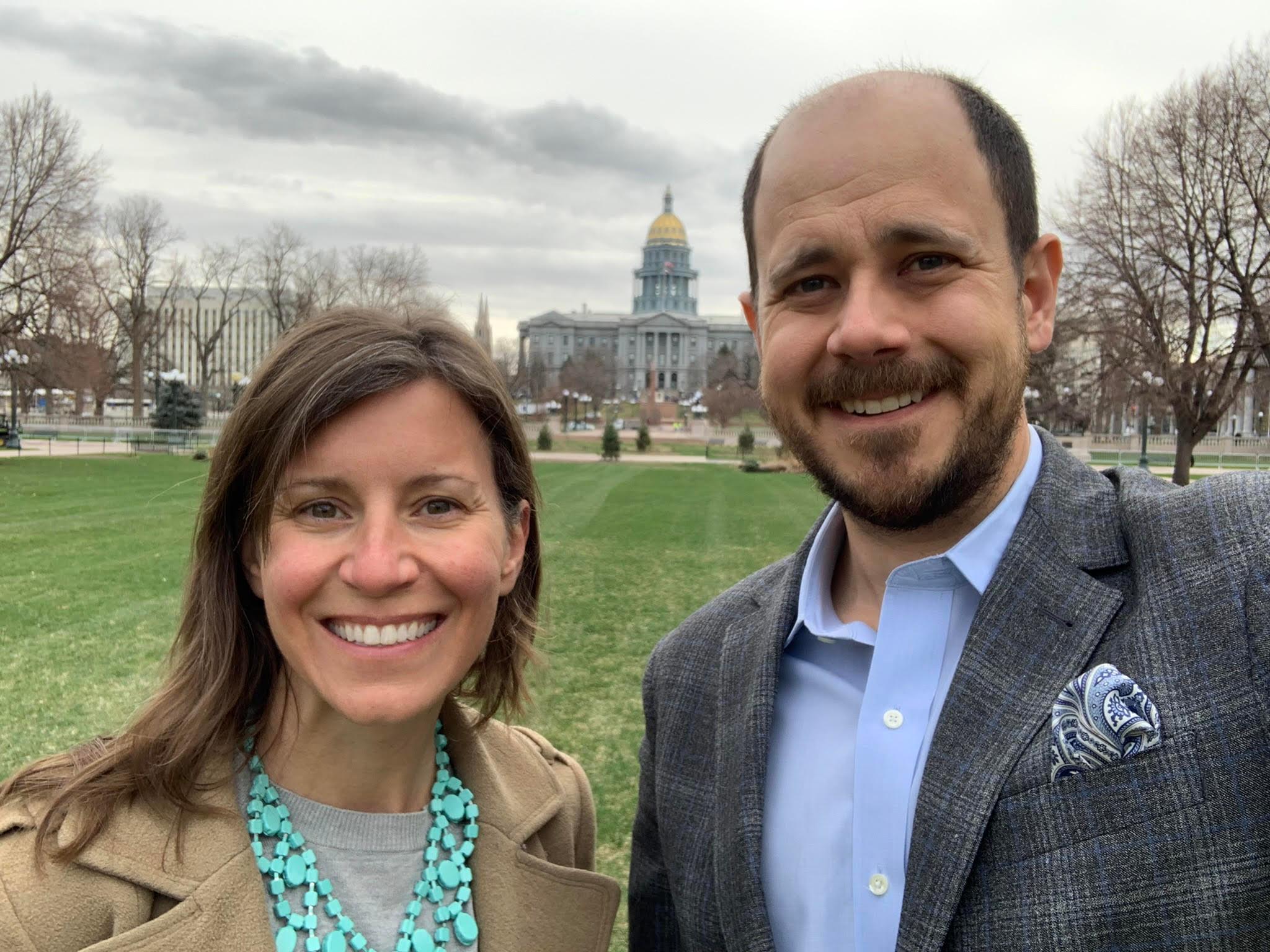"Think about the way the world is and the way that the world could be."
That's the introduction to each episode of Elevated Denver, a new 10-episode podcast that explores Denver's relationship with homelessness through conversations with those impacted by it, as well as with those working to solve the issue.
The podcast is the first product of Elevated Denver, a new initiative "to co-create just and equitable systems that promote the enduring well-being and dignity of all of Denver's community," according to the project's website. Cofounded by Johnna Flood, Tony Mainardi and Nathan Havey, the group hopes to inspire civic, business, non-profit and neighborhood leaders to make sustainable change in Denver on the individual and institutional level, with the goal of making Denver better for everyone.
"The vision of what an 'Elevated Denver' is, is a future state for our city in which everybody can meet their basic needs and pursue their dreams, in a way that's also socially and environmentally sustainable," Havey said. "And when we look at the city today, that's not at all what we're seeing here. There's this sort of tale of two cities."
The hope is that through storytelling, the podcast might help listeners not only understand the complex dynamics that might lead to someone becoming unhoused and what it might take to end the issue for good, but relate to the issue on a human level.
"When you do that, there's a part of yourself that gets humanized as well," Havey said. "Just this understanding that we really are all in the same boat. We are all in the same city. And it's on each of us. This isn't their problem. This is our problem."
Before co-founding the group, Havey had worked as a corporate consultant. While Havey says he'd always been committed to creating social change through his work by helping businesses improve their social and environmental sustainability, a few years back he realized that what he was doing wasn't grounded in Denver. He was travelling around the world to meet with clients, but, he said, he wasn't creating the same kind of impact on a local level.
Havey met with Flood, who for years had worked with local nonprofits, and Mainardi, who has decades of experience advising businesses. They discussed how to create solutions for local problems.
"I think it's clear that our current social safety net is not designed to support the depth of need that we're currently seeing," Flood said. "And as we dug in, what we realized is housing is really a root cause of a lot of other things that people are dealing with. And so that was an impetus too.
"Let's go to the root, or, let's go to a root, and really dig in there and see what we can find. Because we believe that if we can address that, there will be reverberating positive impacts moving forward."

They decided to explore this issue of homelessness through a podcast, which they felt would help them present the issues in an engaging storytelling format.
They were also working without outside funding, and a podcast seemed like a low-expense medium. But they also felt it might be effective to approach the topic episodically, enabling them to lay a foundation for understanding the issue, and to build on those ideas gradually.
"There's so much misunderstanding about the issue that you really need to create some kind of - this might not be the right metaphor - but like a trail of breadcrumbs, to help folks to kind of get to a place where you can have a baseline of understanding to then begin the actual work of having a conversation around this," Havey said.
The podcast was a year in the making. They started by speaking to local experts, like representatives for Colorado Village Collaborative, Safe Outdoor Spaces, Warren Village and Colorado Coalition for the Homeless. Many of these groups stayed involved throughout the process as advisors and collaborators.
They also wanted to elevate the voices of those most impacted by homelessness in Denver. Through contacts with local organizations, the team was able to connect with people who are currently or were previously unhoused. Flood said that in approaching these folks for interviews, it was important to get "actively informed consent," and that the Elevated Denver team were considerate of the fact that it could be traumatic to relive their stories. Before recording interviews, the team had multiple introductory conversations with these folks to make sure they understood what the interview process would look like, and let them know they could pass on questions they were not comfortable with.
"We really sat down with folks and let them know what this would entail, not just the interview process and the types of questions we would ask, but also that we would be putting it in the podcast and sharing it out, hopefully with a very wide distribution," Flood said.
Havey said they also made a point to use as little narration as possible throughout the series to allow the interviewees to tell their own stories - "So that people could hear not my voice, but their voices," he said. "The people that are literally spending their careers working on this, the people that have lived these kinds of issues before."
The podcast is set to drop Wednesday, Apr. 20. Each of the 10 episodes is about 30 minutes long, and each builds off of the one before, painting a broad picture of the issue.
Episode one does most of the heavy lifting in terms of setting up the issue. The team introduces the project, and talks to local leaders about how people may end up unhoused, distinguishing between stereotypes and the realities of the issue. The episode draws attention to the disparity between the rate at which income has risen in Denver and the higher rate at which the cost of living has risen. It explores some of the options people have when they lose stable housing, what their obstacles to escaping homelessness might be and how Denver has approached the crisis so far.
It also explains that there is a deep correlation between trauma and homelessness. Many individuals who experience homeless have also experienced childhood trauma and the experience of homelessness is in itself traumatizing, which can make it harder for someone to get back on their feet and rebuild their life.
"My worldview was completely shifted as a result of this project," Havey said. "When we started this, I understood that homelessness was an economic phenomenon, primarily, and that it was solvable. I still had a lot of the stereotypes about substance abuse and about mental health -- and that stuff is totally there. But I think the context that I didn't really have is the relationship between homelessness and trauma."
After the first episode, the podcast delves more deeply into each of the points it introduced. In episode two, a woman named Myra shares the story of her past experiences with homelessness. She explains the factors in her life that led her to that point, what that experience was like and how she got out of it.
"We really let her story come through," Flood said. "And it shows just how human this issue is, and how relatable, if you sit with it, it could be to anybody else's story."
In the next episode, listeners take a tour of the St. Francis Center, a Curtis St. shelter serving metro Denver. We hear from an outreach officer at the center about what he witnesses daily, and why he does this work is life-affirming. He explains how sees a story and a human being in each person.
"You can't underestimate human grace," the officer says. "That makes the world go round."
In later episodes, we meet people who're currently experiencing homelessness, and tour a Safe Outdoor Space. We learn about the world of affordable supportive housing, and how hard that world can be to navigate for someone trying to get out homelessness. We meet people who've gone through and now work at Warren Village, an organization that helps low-income single parents emerge from poverty, and learn what it's like to raise children while dealing with homelessness. We learn about systems like redlining that have historically contributed to Denver's homelessness crisis, and the social, political and economic obstacles to building more affordable housing in Denver. We learn about the city's camping ban approach to crisis, and hear from Chief Housing Officer Britta Fisher about the city's five year plan for addressing the crisis, and what else might be needed.
The podcast ends with a call to action
"It's not up to the city. It's up to the nonprofits. It's all of us that are complicit in various ways," Havey said. "And if we're going to do this, we need to do it together.
"I would imagine that many people will be inspired to support some of the nonprofits that are doing phenomenal work either financially, or in a volunteer capacity, if they can," Havey added. "I think they'll have a little bit more empathy for people that are in their own social circles that might be in a place of real financial insecurity, and what they can do to be able to strengthen the economic and social safety nets in their own social circles."
Elevated Denver, Flood said, will live beyond the podcast.
"The hope is to build a new collaborative infrastructure, to design and implement truly cross-sector solutions, like nonprofit, government, for profit, with community, to homelessness and other pressing problems that we're facing in Denver," she said.
The team hopes to bring these groups together to think about the "Elevated Denver" imagined in the final podcast episode, and how we can get there.
"The intention is not necessarily to create a new organization that's going to do this," Havey said. "It's more of a structure and an ecosystem of all of the players that are there and new ones."
He said there are lots of siloed approaches to solving homelessness and that these approaches would be more effective if networked.
"When you're siloed in one thing, you fail to see some of the interconnections and the assets and resources that can be brought to bear if you get out of the silo," Havey said. "And so I think that it's actually both a siloed approach, which already exists, and then this deliberately not-siloed approach that's broad and interconnected. And that those things together might yield greater results than either alone."
Elevate Denver hopes to facilitate conversations amongst these entities to see how they might work to improve the whole system, where there might be gaps, where there are redundancies and where there are opportunities for collaboration.
"There's so much momentum to work on this issue," Flood said. "We know that there's so many people doing really great things, and yet, it's getting worse. And so I think people are seeing hope in a different approach to this."
Elevated Denver's podcast drops Wednesday, Apr. 20. You can listen on Spotify, Apple Podcasts or wherever you get your podcasts.













